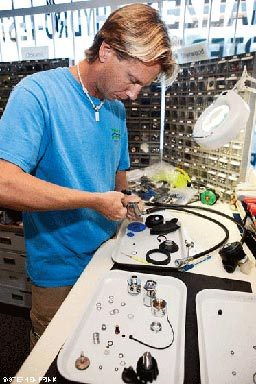Q: I recently had a concussion. Is it safe to dive?
A: The risks associated with diving after a head injury are directly related to the severity of the injury and the time elapsed since it occurred. The primary concerns for dive fitness are diminished cognitive ability and post-traumatic convulsions.
Even minor head trauma can cause brain injuries that may lead to unconsciousness or amnesia. In addition to diminished cognition, a post-concussive syndrome may manifest as recurring headaches, dizziness, poor concentration and memory, unsteadiness and irritability. Anxiety, depression and personality changes can also occur. Any of these symptoms have the potential to severely distract a diver and might cause diagnostic confusion with decompression sickness (DCS) if they were to occur after diving.
The likelihood of post-traumatic convulsions diminishes over time, so divers should delay diving for at least three years following a severe head injury, one year following a moderate head injury and one month after a mild, uncomplicated head injury. The severity of a head injury is determined by a physician and is based on the length of post-traumatic amnesia — the time from the injury until the beginning of uninterrupted memory.
It is likely all symptoms will have resolved by the time these delays have been met, but if any symptoms persist, a doctor with specialized training in dive medicine should approve of diving before you return to the water. Deficits in memory, understanding and concentration are obvious risks in diving. The extent to which such symptoms might impact medical fitness for diving can be estimated by social, school or job performance. If these skills are intact, it is unlikely your physician would restrict diving. Motor skills must be normal, and you should not have any diminished ability to handle stress, prioritize or remain focused. Diving does not worsen the symptoms of head injuries.
Q: I am signed up for an open-water certification course but just found out I am pregnant. Can I at least participate in the pool sessions?
A: There are risks inherent to all dives, even those done in the pool. Dive injuries such as arterial gas embolism (AGE) and pulmonary barotrauma can occur in water as shallow as 4 feet, and both have the potential to cause serious symptoms.

AGE (which can occur with or without pulmonary barotrauma) is characterized by the presence of gas bubbles in the arterial circulation. These bubbles are distributed throughout the body and may interrupt circulation or cause direct tissue trauma to the fetus.
While not a concern during pool training, DCS is a risk for both the mother and fetus when diving and is an additional reason to postpone all diving until full recovery following delivery.
The definitive treatment for decompression illnesses (DCI) is hyperbaric oxygen therapy (HBOT). In addition to the potential fetal risks associated with diving, HBOT may also cause unintended harm. Because of this, the deliberate exposure of pregnant women to HBOT for research purposes is considered unethical, so definitive data do not exist. However, animal studies support this concern by showing some added fetal risks.
Most mothers are careful to limit or avoid alcohol, tobacco and caffeine during their pregnancy, and it seems reasonable to add all scuba diving activities to this list. Dive medicine experts and training organizations all agree that while the risk may be small, it is avoidable. With all the emotion tied to pregnancy and the hopes for a healthy baby, there is no reason to risk harm or a life of second guessing if birth defects were to occur.
Q: While doing maintenance on the second stage of my regulator for the first time since I bought it five years ago, I found some colored buildup. What is this, and why did it occur?
A: Ownership of dive equipment comes with responsibility. Like all dive gear, regulators are frequently exposed to harsh conditions. Salt, dirt and residual moisture that aren’t cleaned out after diving may eventually accumulate and cause functional problems. The presence of the gunk you described is not uncommon in regulators that haven’t been properly rinsed and maintained.

The National Oceanic and Atmospheric Administration’s dive manual recommends rinsing regulators with fresh, clean water at the end of each day of diving, especially after saltwater dives. It is best to rinse while the regulator is connected to the cylinder with the pressure on; the air pressure ensures that no water gets inside the first stage. Rinse the first stage, the hoses and both the inside and outside of the second stage.
You may also rinse the first stage with the dust cap in place if it is not possible to rinse while it’s attached to a scuba tank. Failure to secure the dust cap in position prior to rinsing will allow water to enter the first stage, which might lead to corrosion. Do not press the purge button while using this method, as this may also allow water into the first stage.
We all want our equipment to perform perfectly, and regular maintanance and cleaning — which take time and effort — give it the best chance to do so. Consistently rinsing your gear is a minor procedural step that can forestall a potentially catastrophic situation.
Manufacturers’ warranties should be considered when determining how frequently to service your gear; some manufacturers require that regulators be inspected and tuned annually to keep them under warranty.

Q: I have started taking a dietary supplement containing nitrogen to complement my muscle-building exercise program. Could it increase my risk of DCS?
A: Nitrogen is present in two primary forms: inorganic gas (N2) and as part of organic amine compounds that make up amino acids — the building blocks of proteins. Organic forms of nitrogen — those ingested in food or supplements — are not absorbed into tissues as a gas and thus do not have any impact on DCS risk.
Inorganic nitrogen gas inhaled under pressure is absorbed by body tissues as described by Henry’s law. With increased bottom time and depth, more gas is absorbed and the risk of DCS increases. Although it is a good idea to avoid strenuous exercise for 24 hours after diving, you can be confident that your supplements will not increase your
risk of DCS.
Q: I’ve heard DAN® has a database of doctors. How do I find one near me who knows about diving and dive medicine?
A: Part of DAN’s mission is to provide expert information for the benefit of the diving public. While there are many questions we can answer on the DAN Medical Information Line, there are some that require a doctor who can examine you personally. Every day DAN medics put divers in touch with local physicians who understand dive medicine.
DAN has built an active network of doctors worldwide who are interested in supporting the diving public and have expressed a willingness to provide various services to divers. Physicians in our network can evaluate one’s fitness to dive through physical exams, examine divers who have symptoms after diving and provide consultations to divers and other physicians when there are questions about dive medicine.
In addition to dive medicine, all the physicians in our network practice in their respective specialties. Additional expertise within our network includes emergency medicine, otolaryngology (ENT), cardiology, psychiatry and many other specialties. DAN referral physicians have undergone additional training in dive medicine to include board certification, fellowship training or continuing medical education.
When a DAN referral physician is not available in a convenient location, DAN medics can speak directly to the caller’s personal physician or put that doctor in direct consultation with another physician trained in dive medicine.
In the event of an emergency or possible symptoms of DCI, activate local emergency services or arrange for safe transport to the nearest emergency medical department. DAN can assist with coordination of care and evacuation, and medics are available 24/7/365 for consultation and interface with treating physicians.
© Alert Diver — Q3 Summer 2011